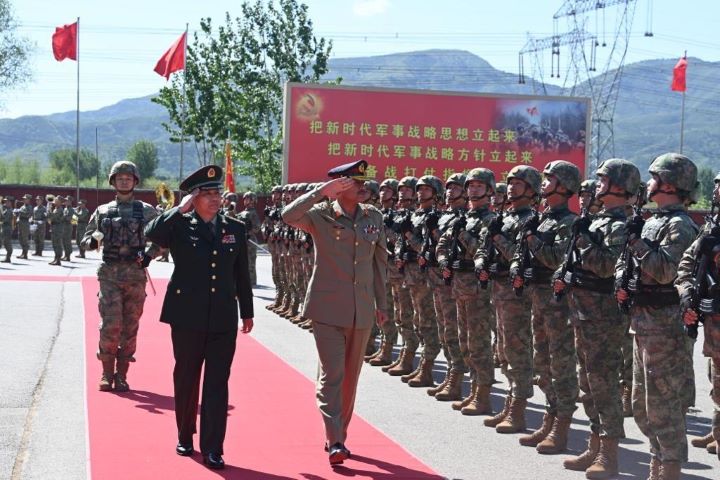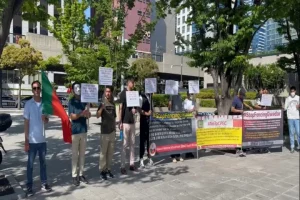Pakistan’s Chief of Army Staff (COAS) Gen. Asim Munir is on a four-day visit to China. This is his fourth foreign visit, which comes after travels to the UK, the UAE and Saudi Arabia.
A statement by Pakistan military’s public relations agency, Inter-Services Public Relations (ISPR), said that Munir visited the People’s Liberation Army (PLA) headquarters and had a detailed meeting with the PLA commander over “regional stability and military cooperation”.
The generals also reaffirmed their commitment to promoting military-to-military cooperation between the two nations and enhancing collaboration in the areas of defence and security, reports the Dawn.
For a long time, the two nations have been holding regular military exercises, defence training, intelligence sharing and border strengthening, apart from the expansive $64 billion China-Pakistan Economic Corridor (CPEC) partnership.
Pakistani chiefs of army staff visiting China is a given tradition. However, what is surprising is the delay in Gen. Munir’s visit considering the proximity between the two nations, and their deep military links. Namrata Hasija, Research Associate at the Centre for China Analysis and Strategy (CCAS), told India Narrative that the Pakistani army chief’s visit to Beijing has actually been delayed because of the poor internal situation in Pakistan.
Also read: A poor Eid in Pakistan and an unhappy one in Balochistan
Hasija says the Pakistani army has strong links not just with the PLA but also with the Chinese political leadership. She adds that discussions about “regional stability” mean that the two nations have definitely discussed Kashmir and India. She adds that China has been pushing India to improve relations with Pakistan for a stabler India-China relationship since at least 2007.
Significantly, Munir is in Beijing in the backdrop of rumours of a military intervention taking place in his country owing to the critical situation – economic, political and judicial – plaguing the country.
Earlier this week, former Prime Minister Shahid Khaqan Abbasi, from the ruling party – the Pakistan Muslim League-Nawaz (PML-N) sounded a warning that the political brinkmanship between the main political parties and the judiciary could tempt the army to take over. Abbasi said: “Pakistan has had many long periods of martial law in very similar situations… In fact, I would say Pakistan has never witnessed a severe economic and political situation before. In much less severe circumstances the military has taken over”.
Gen. Munir is in China also at a time when relations between the two nations are abysmally low. Among a plethora of problems, the latest to test the all-weather relationship is the solitary confinement and charges of blasphemy and extremism filed against a Chinese engineer by the police.
Identified as Tian, the Chinese national had to be evacuated from the site of the Dasu hydro-power project in Khyber Pakhtunkhwa to save him from a mob of workers wanting to lynch him for disrespecting Allah. Tensions had built after the Chinese said the workers were wasting “precious time” in prayer breaks during Ramadan. The incensed workers mobilised people from nearby villages, pelted stones at the Chinese camp and gave calls for beheading the Chinese national.
Besides this incident, Beijing is also miffed with Islamabad over its fiscal nonchalance in the mega CPEC partnership where Islamabad has not kept its side of the financial commitment and also withheld payments to Chinese power companies. Beijing is also peeved with successive Pakistani governments for not providing protection to its nationals who have been targeted by various insurgent groups in Sindh, Balochistan and Khyber Pakhtunkhwa. An unstable Pakistan even closed down Chinese businesses in Karachi as it could not provide security to Chinese establishments.
Rising violence in almost all regions of Pakistan has added to China’s worries. It recently closed down the consular section in its embassy in the Pakistani capital citing increased threat perception due to the Tehreek-e-Taliban (TTP) attacks.
Coincidently, the Pakistani army chief’s China visit falls on the first anniversary of the suicide bombing by the first female Baloch suicide bomber, Shari Baloch, who had killed three Chinese teachers of the Confucius Institute at the Karachi University on April 26, 2022. For a brief while a shocked Beijing had recalled its teachers at Confucius Institutes back to China, handing over the teaching to local Pakistani teachers in May 2022.
Despite deepening problems and regular incidents of mistrust between the two nations, Hasija says that Pakistan and China will try to make amends in their relations because Islamabad needs Beijing more than ever for economic support and military hardware. In turn, “China will use Pakistan to fulfil its own geo-strategic goals like constructing the Gwadar port for access to the Indian Ocean”, and to keep a check on India through various means.
Also read: Why are the Muslim nations keeping quiet over Xinjiang abuse?




















